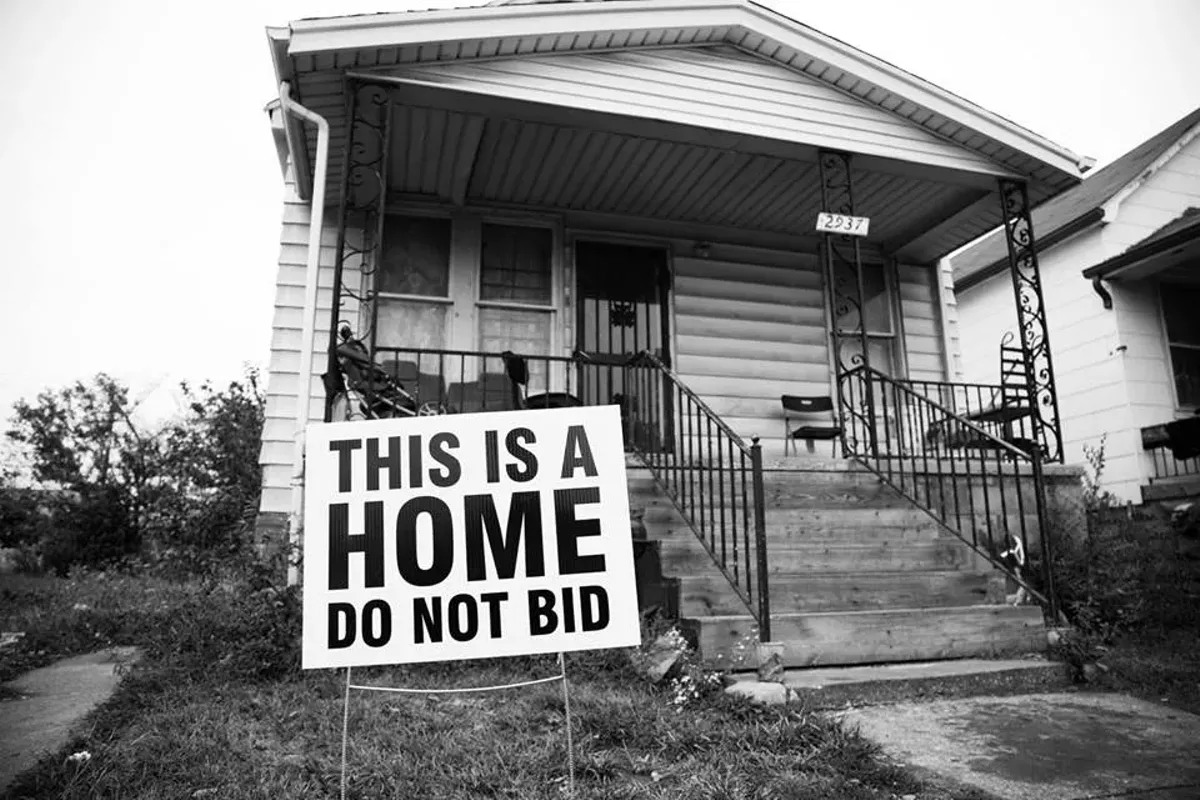At the time of this writing, Detroit is in the midst of yet another round of the staged cage-fight that is the tax foreclosure auction. In many ways this feels like an individual fight — one home at a time fighting to mitigate the harshest consequences such as eviction, homelessness, and permanent property damage. Yet this issue affects the city as a whole, and it's important that we do not become desensitized to the routine social violence that it represents. The truth is that Detroit is for sale by our own local government, and it is time to challenge the convenient notions that help us fall asleep at night.
In its barest terms, here is how the tax foreclosure process functions in Detroit:
When you own a home, you have to pay taxes. Every year, the city of Detroit assesses the property value and issues two tax bills accordingly. Property taxes help pay for infrastructure, libraries, the zoo, schools, garbage pickup, and so on. If the city taxes are not paid, the debt gets passed on to the Wayne County Treasurer, which acts as a collections agency, tacking on 18 percent interest per each year if the taxes go unpaid. After three years, state law requires that the Wayne County Treasurer foreclose on the property and put it up for sale in an auction, where it is sold to the highest bidder.
Under this system, one out of every three Detroit properties has been put up for auction by the Wayne County Treasurer since 2002.
Understandably, the consequences of such massive forced turnover in property ownership are severe. The system provides a harsh penalty for violating the social contract: pay your taxes or lose your house. However, it fails to address the underlying reasons for tax delinquency or adequately recoup lost revenue, and leads to deep and enduring consequences that devastate the city as a whole.
Myth 1: The system is fair
Forget for a moment that Detroit already has one of the highest effective tax rates in the country. Let's start by looking at the earliest stage of the tax foreclosure process, which is tax assessment. On an annual basis, every local taxing authority is required by law to assess the value of a property so that it can levy an appropriate tax bill. In Detroit, this was not done in accordance with the law for a number of years until 2017. One study by academic and activist Bernadette Atuahene shows that up to 85 percent of assessments violated Michigan law between the years of 2009 and 2015, and that homes with the lowest values were over-assessed by the greatest margins. This means that low-income homeowners bore the brunt of the injustice.
If taxes had been fairly assessed, plummeting property values would have created a severe deficit in the city budget and it may have also been tactically unfeasible to keep assessments up with the actual values due to understaffing at the city level and rapid changes in the real estate landscape. Regardless of the reasons, the fact remains that the very bills that are the basis for these foreclosures are fundamentally incorrect.
The city of Detroit was under state oversight for its handling of property assessments and addressed the problem with a wide-reaching reassessment effort, which resulted in reduced tax values for 94 percent of homeowners. While this was a welcome relief, the breadth of the change demonstrates the extent to which the assessments had been chronically incorrect. Atuahene's research suggests that these adjusted assessments still fall short of correct values for properties under $18,000.
Even when current assessments are corrected, delinquent taxes still weigh in at the bloated values of past years — plus interest.
The volume of low-valued properties laden with impossible tax debt led the State legislature to pass a bill three years ago that would allow homeowners to cut their debt to half of the State Equalized Value. This was championed by Mayor Duggan as an outlet for at-risk homeowners and appeared to be an acknowledgement of the historically inflated assessments. The problem was that the Wayne County Treasurer issued almost none of these payment plans and they are no longer available because the state law that provided for it has since expired.
And so, many homes are lost each year in accordance with one law, while the debt that triggered the foreclosure is based on the violation of another law.
Myth 2: There is a safety net for poor people
One state law that helps to soften the draconian foreclosure system states that a homeowner who cannot pay their taxes because they live in poverty is eligible for a tax exemption. Fortunately, Detroit has a very generous "Poverty Tax Exemption" policy, which affords a low-income homeowner the chance to eliminate all taxes (other than waste pickup fees) for the year. Even so, this outlet is not advertised widely and a mere fraction of eligible homeowners actually receive it. Recent improvements have made application and approval easier, but further changes are needed to improve access. FOIA data shows that 4,000 households received the hardship exemption in 2016, yet the American Community Survey estimates 40,000 owner-occupied homes in Detroit earn under $25,000 per year, so it is clear that only a fraction of those who qualify for this exemption are receiving it.
Among low-income homeowners who do manage to get the poverty exemption, it is often too little, too late because the exemption cannot be provided retroactively under current policy, even if the homeowner would have qualified in past years. Once again, homeowners are left to play catch-up on the interest-laden over-assessed back taxes or risk losing their houses.
Another provision for struggling homeowners is the Step Forward program, which ostensibly provides relief for those "hardest hit" by the housing crisis. These are federal funds intended to pay off liens such as mortgage or tax delinquencies in order to allow residents to remain in their homes.
The fund is managed by the Michigan State Housing Development Authority (MSHDA), and, to date, about 10,500 Wayne County homeowners have received assistance. But as the mortgage crisis translated into a tax crisis, this resource has failed to adequately address the problem. About $39 million in homeowner support remains, but MSHDA's narrow application criteria disqualify the majority of Detroit residents who apply. As a result, the money remains in the state's hands while thousands of distressed owners lose their home for lack of relief.
Once homeowners lose their homes, they also lose their rights. Ownership and all equity in the property is lost, and residents become vulnerable to eviction, rent gouging, and land contract scams aimed at those desperate to break the cycle of displacement. All of the gains in black homeownership since the passage of the Fair Housing Act in 1968 have been reversed in the housing crisis, according to the Urban Institute.
Myth 3: We are winning in the fight on blight
In light of the inability of MSHDA to disseminate Hardest Hit money under the Step Forward program, local government has found a creative alternative use for these funds — blight removal. Currently, the Detroit Land Bank Authority has $139 million for demolition in the "Blight Elimination Program" from funding that was initially intended to bail out homeowners.
It is both more expensive and less effective to demolish a property than to prevent a foreclosure, yet there are more funds placed toward demolition and lower criteria for the use of those funds. While MSHDA denies half of homeowners who seek assistance, there are zero denials for demolition projects.
The basis for this practice is the idea that the presence of vacant, blighted homes risk the stability of the neighborhood by depressing nearby property values. Once demolished, a blighted home no longer exerts this negative influence on its neighbors. On its face this theory is not controversial, but it becomes messier in the context of the ongoing foreclosure crisis.
The average cost of demolitions clocked in at more than $14,000 at the end of last year — about twice the tax debt on the average occupied home in foreclosure, which is approximately $7,800. Stated another way, the $139 million blight dollars that could save over 17,000 homes will instead be used to demolish half that many houses (that, chances are, went through foreclosure in the recent past).
If these funds were used to prevent foreclosure, the delinquent property taxes of occupied homes could be paid in full, meaning that the homeowner would remain the owner, the government would collect its delinquent taxes, and the house would likely remain occupied.
Studies have shown that when occupied homes go through tax foreclosure, one in six become vacant within a year. When federal funding runs out, we will find that we have created more blighted homes than we demolished because we failed to address the root cause.
The sheer volume of blight that is propagated by tax foreclosure means that the use of Step Forward funding to remove blight is both less effective and more expensive. During a plague, one cannot invest solely in the morgue.
Myth 4: The auction is only for people who deserve it
One of the most insidious things about the tax auction is that it is such an effective tool for siphoning individually owned properties into the hands of relatively few mass-property owners. It is largely due to the tax foreclosure auction that the Detroit Land Bank Authority now owns an estimated 90,000 properties, and the auction has broadened the portfolio of individual investors by hundreds of properties each year. In last year's auction about 1,525 properties — 26 percent of sales — were sold to the top 20 most prolific bidders. Those groups tend to target occupied homes for purchase, meaning that few, if any, of those properties will be owner-occupied in the future.
In 2014, Michigan passed a law to end abuse of the tax foreclosure system by those who intentionally dodge taxes, recycle their property through the auction, and buy it back at low prices. The law requires that anyone purchasing in the auction must agree to an affidavit stating that they had no delinquent taxes, unpaid civil fines or penalties. However, the law has failed to address the problem because it casts so wide a net that it does not differentiate between franchise slumlords, nonprofit support groups, and individuals with unpaid parking tickets.
Whereas an individual cannot easily change their name to avoid detection in the auction, companies have little problem reincorporating. There is the tongue-in-cheek "Ethical Property Management," and the more brazen "Exit Strategy" umbrella of companies, which includes such names as "Exit Strategy April 13, LLC" and "Exit Strategy May 13, LLC." Regardless of their methods, the fact is that we have neither laws nor enforcement that address the abuse of the auction by extractive property "investors."
But the law is based on a tragic misconception: It is true that landlords may choose not to pay property taxes in order to extract rent without investing in the home, and may then try to buy that house or another in auction. On the other hand, it is not true that homeowners willfully shirk taxes they can afford to pay and put their very homes on the line in order to possibly get a deal. When owners could buy back in the auction, it was truly their last resort, and now that option no longer exists.
While companies escape scrutiny by mercurially reincorporating under different LLCs, individual homeowners dare not bid in their own name and nonprofits dare not help them. So, they are left as sitting ducks to wait out the auction until that inevitable knock comes on the door.
Myth 5: The crisis is over
Detroit got a new narrative when it emerged from bankruptcy and moved out of emergency management. The dream of the comeback is one that no one wants to refute, but the sad truth is that the neighborhoods are under attack in ways that more or less began in tandem with the fairy-tale ending.
The cornerstone of post-bankruptcy Detroit's solvency plan was "credit worthiness," as demonstrated by the prompt and aggressive collection of debts. Hence 2014 was both the peak of the Detroit water crisis, in which 33,000 homes had water service shut off, and of the tax foreclosure crisis, in which over 7,000 occupied homes were sold in auction to the highest bidder.
These draconian measures demonstrate to creditors that Detroit intends to collect on its debts and is therefore a viable asset. Unfortunately, this deference to short-term financial solvency values punishment above consequences and individual accountability above collective cost. Each year, there are fewer and fewer households with water to shut off, fewer owners to strip of their title. That is why, even when the numbers go down, they do not add up to success because we have in no way recovered from the impact of the years before.
The roots of the tax foreclosure problem are neither simple to trace nor easy to solve, but in many ways this is a government problem that requires government solutions. Fortunately, there are many actionable government solutions that could have immediate positive effect including use of "Right of Refusal" by local bodies to protect occupied homes, improved dissemination of Hardest Hit funds, expansion of proper tax assessments and exemptions, and changes in state law that allow retroactivity for exemptions and greater local control. What's needed is for all levels of government to act where they can and work together, rather than pointing fingers or avoiding the issue.
Tax foreclosure is an autoimmune disorder attacking the body of Detroit: it drives poverty, serial displacement, blight, and crime; it hinders schools, public utilities and infrastructure; it dissolves the intangibles like neighborliness, community, stability, and sense of place. The truth is, it doesn't have to be that way. And the truth is there can be no true comeback until we stop destroying what we already have.
Michele Oberholtzer is the coordinator of the tax foreclosure prevention project with United Community Housing Coalition. She is also the founder of the Tricycle Collective, a woman-led volunteer nonprofit working to support Detroit families with young children who live in homes facing tax foreclosure. More information is available at thetricyclecollective.com.







